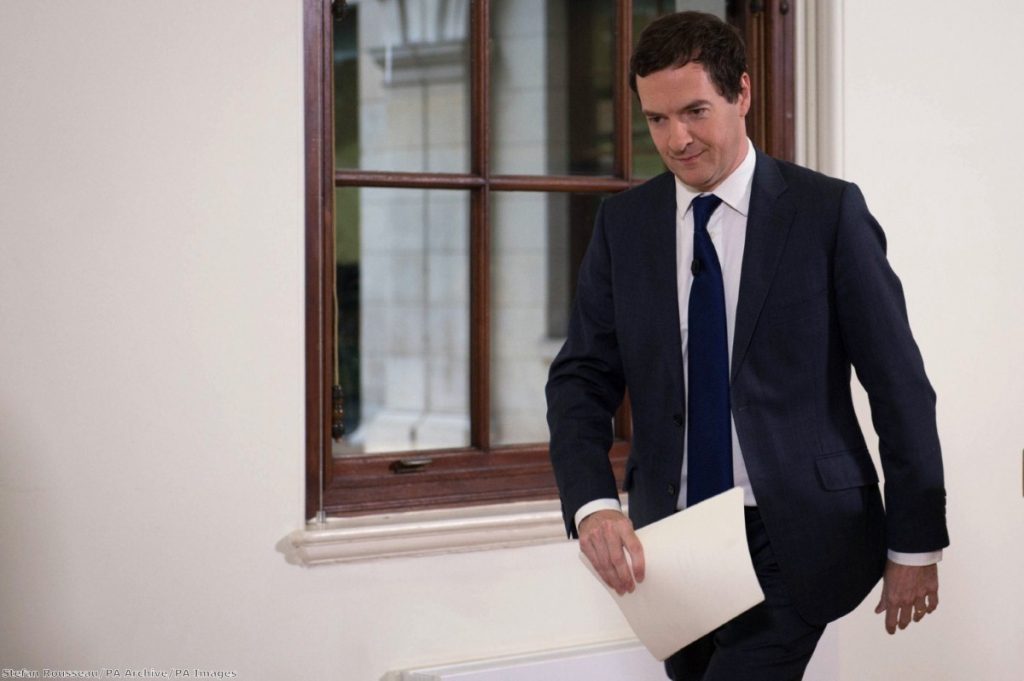By Robert Barrington
Opinion surveys regularly show that the public have a low opinion of our politicians. Fifty-nine per cent of UK citizens believe the government is 'entirely' or 'to a large extent' run by a few big entities acting in their own best interests. Sixty-seven per cent say that UK political parties are corrupt. So while it may seem a natural and unproblematic transition to George Osborne himself, ordinary voters might conclude that skipping from Chancellor to a £600,000 two-day-a-month job in the City in a few months looks simply corrupt. It looks like the gilded out-of-touch elite feathering their own nests, and it takes a very short leap of the imagination to conclude they do the same when they are in office.
But those in politics seem to be in active denial about the problem. They characterise the noise that surrounds each scandal as a by-product of party politics, without ever being willing to respond to the real issues. And of course, there will be vested interests who have good reason not to admit there is a problem, let alone implement solutions.
To be clear, Osborne and others are generally following the rules. Westminster and Whitehall balk at the word corruption when applied to themselves. Corruption is a big word, and it may be that the significance of the Osborne case is not that he himself acted corruptly, but what he has shown us about the gaping holes in the system – as well as how such behaviour is perceived by the wider public. There is a gulf between the impression of the system shared in Westminster and that in the country at large. That's a problem for three reasons.

First, there is certainly some corruption involved here. Denying it just means we ignore it. The law of averages tells us that, by any definition, some of our parliamentarians and senior civil servants will be out-and-out crooks. Remember MPs expenses? Lots of people's actions fell into a grey area, so they were not prosecuted. But six were successfully prosecuted. So at a minimum we need a system that does not allow the crooked to get away with it. Ideally, a system that rewards good behaviour, and discourages poor behaviour.
Second, we should be wary of this growing gap between what the public think and what Westminster and Whitehall think. Donald Trump came to power claiming he would "drain the swamp". It has been a feature of recent politics around the world – Russia, Turkey, Hungary, to name but a few – that 'strongmen' come to power on an anti-corruption ticket and very shortly afterwards become even worse than those they managed to defeat. Elsewhere – Austria, France, the Netherlands – populist politicians ride the wave of the anti-establishment, anti-elitist mood. This was surely what Theresa May was responding to when she came to power, in promising "a country that is run for everyone".

Could it happen here? Could a populist party gain power on an anti-corruption ticket? The Osborne affair comes on top of many other such unsavoury moments. It's difficult to know whether the tipping point will be an accumulation of these smaller incidents or one gob-smackingly large one. But there is a tipping point, and the UK will probably reach it one day unless action is taken.
Thirdly, the current rules are clearly not fit for purpose. Transparency International's research had found no fewer than 39 loopholes in British lobbying and influence, even before the Osborne affair. Take the Advisory Committee on Business Appointments, for example. This is the organisation which is meant to clear post-ministerial employment. It is so toothless that Osborne clearly felt no pressure to clear his Evening Standard post with them before he accepted and announced it. And even if it had advised him not to take the job, he could have ignored the advice with no penalty.
George Osborne will reportedly be speaking at a Hedge Fund summit in Paris on his second day as the London Evening Standard's news editor pic.twitter.com/rlGz9oE1e3
— i newspaper (@theipaper) March 31, 2017
Even though corruption hides itself, the public has seen enough of what has slipped through the loopholes to be thoroughly disenchanted. The problems come broadly in four areas: the revolving door, conflicts of interest, lobbying, and party funding. In all of these, the remedies are a mixture of properly enforcing existing rules, transparency, behavioural incentives, new rules, stronger oversights and genuine disincentives.
Though not yet a crisis, this situation could become one at any time. There is an obvious place to commit to reform: the forthcoming national anti-corruption strategy. It is said that one of the battlegrounds is whether corruption in politics should be included. Certainly, it is a key test of whether this government understands the nature of corruption in the UK and how the British people feel about it.
Robert Barrington is executive director of the UK chapter of Transparency International, the world’s leading anti-corruption organisation with chapters in over one hundred countries. He is an authority on global corruption, corporate bribery and corruption within the UK, and has worked in academia and in the City.
The opinions in politics.co.uk's Comment and Analysis section are those of the author and are no reflection of the views of the website or its owners.





-01.png)